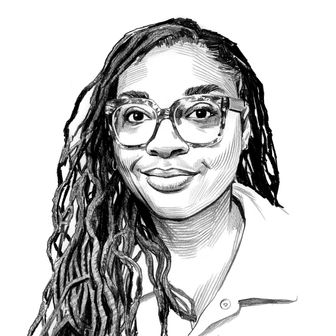
When I casually discuss Donald Glover’s work with my friends, especially his old music, the repeated phrase that comes out of my mouth is “He needs to seek therapy.” To my delight, my wish was somewhat granted in this episode of Atlanta as we get a peek into Earn’s head as he works with a therapist to deal with the anxiety causing him heart troubles. Therapy episodes are one of my favorite television subgenres as it’s an easy yet thoughtful way to do a character study in a single story line.
Before watching this episode, I was consumed by a discussion I’ve been watching play out on my Twitter feed regarding Black people who have felt ostracized from their community due to behaviors deemed “white” by other Black people. The conversation became fairly nuanced, touching on how ostracism can lead to internalized racism and anti-Black thought in those who felt left out, these people sometimes falling into the “I’m not like those other Blacks” narrative. Naturally, this, combined with my looming deadline for this recap, reminded me of Glover’s career. Much of his early work is rife with cliched but genuine feelings about being “too white” for the Black kids and “too Black” for the white kids and how that bred deep resentment in him toward both races. In an Instagram post uploaded after he departed from Community, he showed hand-written notes that listed some of his insecurities. One read: “I’m afraid people think I hate my race,” proving he’s aware of how his complicated feelings toward his own people are viewed by outsiders.
Despite my own criticisms about Glover’s tendency to pander to white audiences, I believe his relationship with race is what makes Atlanta stand out in the first place and makes its specific brand of Afro-surrealism unique. As D. Scot Miller wrote in his Afro-surrealism manifesto, “Afro-surrealism sees that all ‘others’ who create from their actual lived experience are surrealist.” Glover’s experience of feeling torn between two cultures, and the absurdity of being in such a predicament merely because of the color of his skin, is the basis of many episodes of Atlanta. In this specific episode, I couldn’t help but draw parallels between Earn’s therapy sessions and Glover’s early statements on race and how both are examples of how racism too easily creates spiteful attitudes, leaving many of us in a perpetual cycle of dissatisfaction.
Due to tightness in his chest and numbing in his arm, a doctor suggested that in addition to the EKG tests, Earn get a psychological analysis to see if his feelings are psychosomatic. At first, he’s more preoccupied with work than actively engaging with his therapist, but after warming up to the therapy process, he shares a story about his time at Princeton. Now that Earn is successful in his career as a manager, his alma mater reached out hoping to set up a speaking engagement. His first response was to tell them to give him an honorary degree or kiss his ass. The university agreed to provide him with the honorary degree, though he still has resentful feelings toward the establishment.
Earn tells his therapist about an unfortunate situation that led to his expulsion from school. When he started as an RA in his dorm, he befriended a fellow RA named Sasha. Soon Earn was offered a job interview that he was excited about and required him to purchase a new suit. One day in the computer lab, his crush invites him to a party in Philly, and Sasha overhears. She offers to keep Earn’s new suit in her room while he attends the party. (Why he couldn’t keep it in his room if he was an RA as well is unclear, but we’ll roll with it.) After the party, when Earn texts Sasha to retrieve his suit, she ghosts him. He texts her multiple times until finally deciding to use his master key as an RA to enter her room and grab the suit himself. The incident takes on a life of its own when the establishment got involved due to what they determined to be an “attack on privacy” and other phrases Earn refers to as “rapist language.” His therapist guides him to realize that this incident is another time he was betrayed by someone he trusted, just like the family member who abused him as a child.
Following the incident with Sasha and his subsequent expulsion from Princeton, Earn vowed to prove everyone wrong. He says: “I love spite. It’s a pure, powerful thing. It gave me courage; I could count on it.” His therapist tells him that though spite can be very powerful, it can leave you depressed and empty, turning your life into “a book written by someone else. Someone with no incentive for your well-being.” In a later session, he tells his therapist about his reasoning behind agreeing to speak at Princeton, saying, “They totally win if I don’t use my position to help people in my experience,” once again showing how a lot of his decisions are reactionary to the racist actions of others. But, as his therapist pointed out, it’s not a war to win.
Anyway, he turns the speaking engagement from merely a work trip to a family trip by bringing Van and Lottie with him so they can go to Sesame Place after. Due to a series of unfortunate events starting with the loss of his driver’s license, Earn’s experience at the airport becomes a long, convoluted journey of arguing with a white woman employee regarding his beat-up passport. It becomes so complicated and undeniably racist that Earn decides to scrap the entire trip. Regardless of how bad the experience was, Earn tells his therapist that he learned he won’t achieve his goals with anxiousness and anger. Then, like many people, he thinks this minor breakthrough is a reason to stop going to therapy, so he tells his therapist it’s time for him to try to handle his life on his own.
As Earn attends his various therapy sessions, a second story line is interwoven into the episode about a middle-aged white woman named Lisa who wrote a children’s book called The Homeliest Little Horse. One day, a literary agent randomly emails her saying he read her book and wants to set up a meeting. She goes to his office where he convinces her that she has written the next Berenstain Bears and wants to find her a publisher. He sets up a story time at the local library for her to read her book in front of children while a publisher comes to check out her work and advises her to get her hair done for the occasion, declaring himself her official agent. She meets with her best friend and ecstatically says that she quit her day job to pursue her writing career full-time, exaggerating what the literary agent said and claiming she’s written what could be the next Harry Potter. Her friend is hesitant to give her full support, saying she can’t afford to help Lisa financially for another month. Lisa asks her friend if she even likes her writing, and when her friend is unable to answer, she storms out.
The day of the library story time comes around, and Lisa arrives in a sundress, a new hairdo adorned with slicked-back baby hairs. The event starts out rocky with the librarian refusing to let Lisa’s “service dog” enter the library with her, regardless of her bullshit note from the doctor. Not allowing this to interfere with her moment, Lisa begins story time with a giant smile plastered on her face as children from the community gather at her feet and a local news network records the event. As she reads her book, the children quickly express their disappointment in the story and eventually leave Lisa alone while they find entertainment elsewhere. The scene ends and cuts to Earn entering a bar with footage of Lisa at her event playing on TV screens. There, he’s seen giving an envelope to the same literary agent who tried to sign Lisa. He then runs into the librarian who refused Lisa’s dog entry, gives her an envelope, and she replies, “Thank you for supporting community theater.” When Al and Darius arrive, Earn tells them it’s a wrap party and explains that these are all actors he hired to fuck with Lisa, a.k.a. the white woman who ruined his Princeton trip at the airport.
Al and Darius are disturbed by the lengths Earn would go to enact revenge on a single person, leaving him alone to think about what he’s done. Darius tells him he doesn’t know if it’s pettiness or extreme terrorism. Earn sits alone at the bar watching the footage of Lisa crying after her humiliation when it dawns on him he probably should go back to therapy.
Atlanta After Hours
• When Earn had his first session, he told his therapist that apart from the Princeton engagement, life has been pretty busy with work and that he’d been offered a creative consulting job offer in Los Angeles and he’s considering relocating. I love this for him; seeing his life evolve outside of managing Al is a proud moment, but I’m nervous that Van won’t want to relocate and he’ll move across the country and away from his daughter.
• Another thing Earn brought up to his therapist about his life developments is that he’s officially off probation! I need to go back and rewatch, but how many years has this poor man been on probation? Since season two?
• Though at first, when the episode opened with Lisa’s character, I did a jump scare thinking we were getting another stand-alone episode/avant-garde lesson about racism. Thankfully, that wasn’t the case. However, I appreciated the irony that Lisa was someone who made life harder for Black people because of her bias and someone who actively consumes and appropriates Black culture. From her music choices to her hair to her taste in men, Lisa’s life is enmeshed in Blackness, whether she consciously knows it or not.
• I enjoyed this depiction of a Black man in therapy, something we rarely get to see televised. Watching Earn and his therapist slowly but surely build a relationship to the point of his therapist buying him a floor pillow was sweet. Though Earn still has plenty of work to do, it’s great that we see him doing the work.


